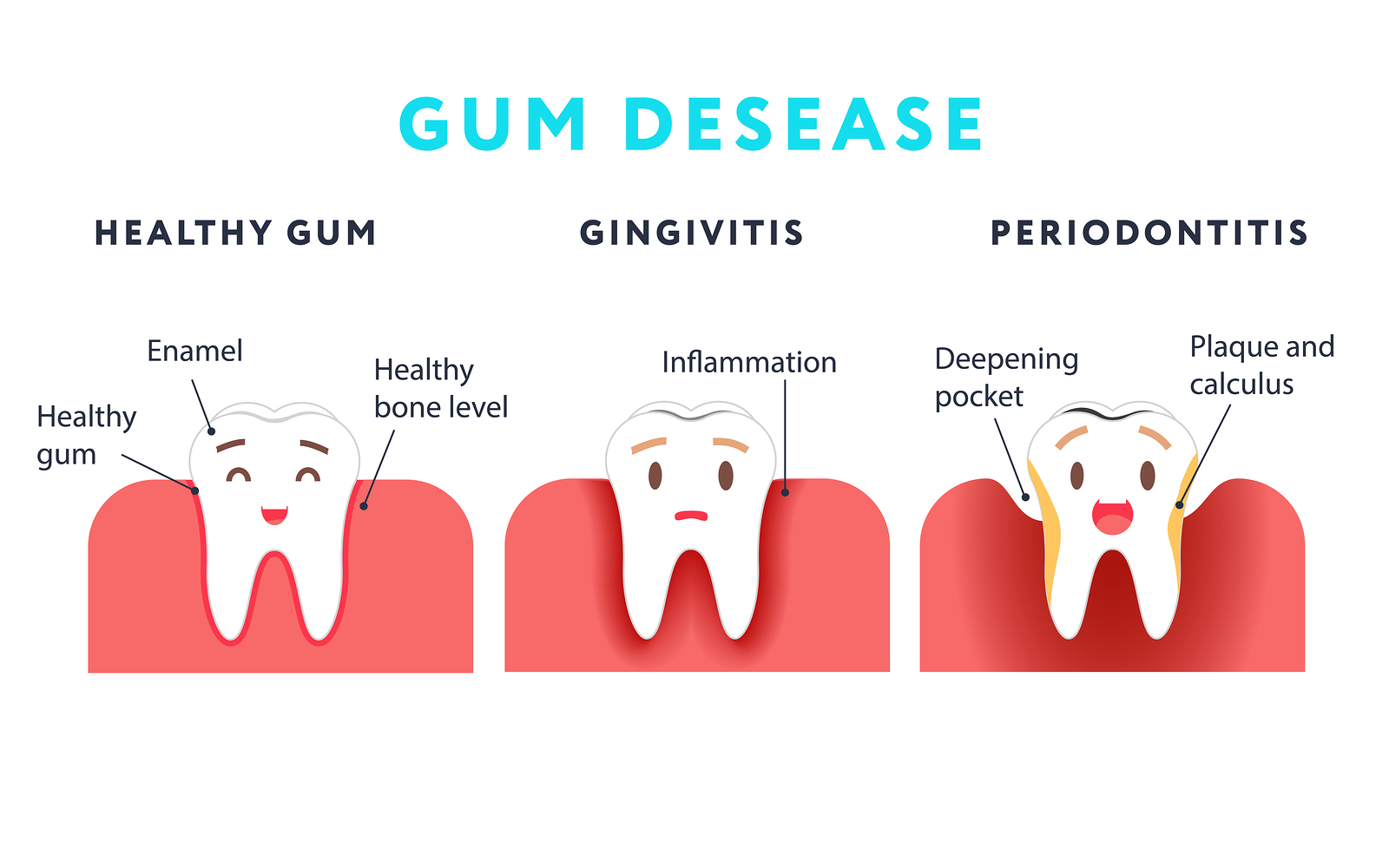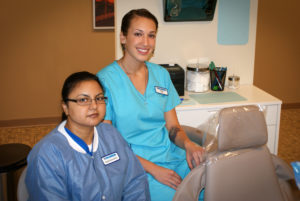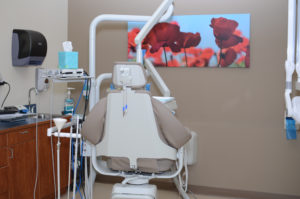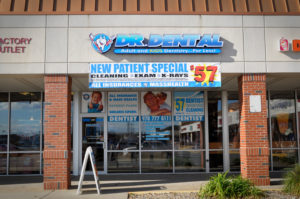Gum disease usually isn’t regarded as a serious oral healthcare problem – but it should be. For a variety of reasons, many people think gum disease (technical term: periodontal disease) is one of those annoying health issues that should simply be managed, not eliminated. Yet equating periodontal disease to a sore knee or a brief cold is counter-productive. Gum disease is one of the most common oral healthcare hazards in the United States; approximately 50% of all U.S. adults suffer from periodontal disease, with nearly 10% of which are considered severe.
What explains the skyrocketing rates of gum disease in the U.S.? It all starts with a plaque attack.
Plaque: The Sticky Source of Gum Disease
Tooth decay and gum disease are a direct result of excessive plaque buildup in the mouth. Whenever bacteria accumulates and is given a chance to thrive – usually through poor dental care habits and a bad diet – the bacteria develops into plaque. When plaque is present on your teeth, it uses food and beverages as a catalyst for growth.
This plaque buildup occurs rapidly – according to some studies, within 20 minutes of eating a meal or snack. Considering how often the typical American eats nowadays, and it’s not hard to see how “normal” levels of plaque in the mouth can quickly spiral out of control.
Once plaque hardens, it develops into a substance called tartar. Tartar provides the ideal environment for plaque to thrive even more. This vicious cycle of plaque buildup, tartar formation and more plaque lays the foundation for tooth decay and gum disease.
How to Stop Plaque and Gum Disease
Dr. Dental realizes the importance of healthy teeth and gums; we provide a full menu of procedures, cleanings, and other oral healthcare services to help:
- Reverse and treat gum disease
- Eliminate plaque buildup
- Prevent the onset of gum disease
- Recognize some early warning signs that typically precede early onset gum disease
Stopping gum disease in its tracks is imperative for optimal oral health. With this in mind, we put together this article as a resource to take action against gum disease. We asked general and cosmetic dental services from around the country on different tips and tricks to prevent gum disease, along with their unique insight on what makes plaque and gum disease such a bad combination for optimal oral health.
We’ll review certain foods and beverages to avoid, which tools (if any) may help in the fight against plaque, and other things you can do to keep your gums and teeth as healthy as possible. Why is this important? Inflammation in the mouth (caused primarily by periodontal disease) is linked to serious health problems, including heart attacks.
Bottom line: if you keep your mouth healthy, the rest of your body has a better chance of staying healthy!
Benjamin A Lawlor BSC, DDS, of Maine Cosmetic Dentistry, recommends any water rinsing device for a post-meal clean, but still thinks the classic dental tools – floss, a toothbrush (regular or mechanical) and toothpaste – are still the best devices for stopping plaque formation. “Think of plaque like grease on a dish. Sure you can rinse the dish off under water, but only when you use a sponge or other abrasive device can you truly remove all the residue,” said Dr. Lawlor. “A toothbrush is like the sponge and the mechanical action is what reduces and removes the plaque.”
Dr. Lawlor suggests that certain foods like cheeses, nuts, apples, celery, firm fruits and vegetables can help keep plaque in check, but there’s still no substitute for an electric tooth brush. As for particular foods that can help fight plaque, Mark Nguyen of OC Healthy Smiles suggest apples are nature’s toothbrush. “This fibrous fruit is great for helping remove plaque from your teeth,” stated Mr. Ngyuen. “But don’t forget about yogurt. The natural bacteria found in plain yogurt is great for your gums since it will replace the cavity causing bad bacteria that currently inhabit your gums.”
Why is plaque such a persistent problem? According to Dr. Harold Katz, it’s because the teeth – unlike the skin, scalp, and other body parts – doesn’t have a regulating system that sheds unnecessary or dead surfaces.
“As a result, vast colonies of microorganisms tenaciously adhere to each tooth’s exterior, consuming mouth debris, reproducing and continuously adding to this biofilm,” said Dr. Katz. “Although this dental plaque film is thought to be a part of an oral defense mechanism that is intended to prevent seriously pathogenic bacteria from rapidly destroying tooth enamel, plaque will cause dental and gum disease as well as bad breath when low pH levels and chronic dryness exist within the mouth. Poor oral hygiene also exacerbates the problem of dental plaque.”
But if apples, cheese, yogurt and other foods help reduce or eliminate plaque, which foods and beverages should be avoided? Mr. Ngyuen puts a large share of the blame on beverages like coffee, tea, soda, and red wine. “According to the American Dental Association (ADA), coffees and teas can dry out your mouth and stain your teeth if consumed frequently,” Mr. Ngyuen said. “Soda and most carbonated drinks are very acidic, making them bad for your teeth since the acidity attacks and breaks down the enamel on your teeth. Red wine and alcohol reduce the saliva flow overtime which can lead to a multitude of dental problems. The most common problem from reduced saliva in the mouth is oral infections and gum disease. Red wine is known to stain your teeth if frequently consumed.” If these beverages are a must-have, it’s recommended to brush and / or rinse within a few minutes after consuming.
But what about a structured plan to avoid plaque and gum disease? Dr. Timothy Chase of Smiles NY recommends sticking to water as your go-daily daily beverage. Flossing also helps. Floss at least once a day, even more if you tend to have food stick between your teeth,” said Dr. Chase. “Gently move the floss between your teeth until it reaches the gum, then pull it so that is partially wraps around each tooth. Toothbrushes can’t reach between your teeth and under the gum line. Floss once or twice a day, preferably after dinner.”
And one more thing from Dr. Chase: avoid brushing too hard. Excessive force can actually cause injury to your gums and can lead to loss of enamel and notching of the root surface of the teeth. Brushing should be done using gentle pressure, with the bristles angled toward the gum line in small circular motions.
Kristen King, RDH, of Origin Dental Wellness, recommends going to the toolbox and finding an accessory that works for you. “An electric toothbrush is a great way to start,” said Dr. King. “It is far superior to manual brushing simply because the human hand cannot move as fast as an electric brush. Electric brushes allow one to do a better job removing plaque in addition to less effort on the part of the brusher.” Dr. King also recommends the following oral health accessories for keeping plaque at bay:
- Floss (of course)
- Proxabrushes
- Soft picks
- WaterPiks
- Air Flossers
- Tongue scraper (more plaque collects on the tongue that you think)
A healthy diet is one of the most underrated aspects of a successful anti-plaque gameplan. “A healthy diet allows the body’s immune system to do its job and heal the body,” said Dr. King “Eating healthy foods such as apples, celery and other crunchy foods also have a slight cleansing effect on the teeth. A healthy diet does not include processed sugar, which is a significant factor in tooth decay.”
Thanks to all of the dentists for their input. With this advice, you have plenty of ammunition in the fight against plaque. If you haven’t been to the dentist in a while and need some help fighting against plaque and gum disease, visit a dental clinic today.












